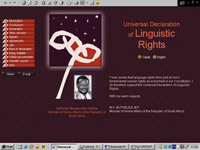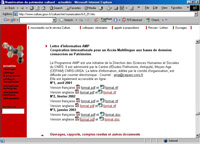
Figure 2: Universal Declaration of Linguistic Rights Homepage
There is a growing movement to encourage diversity of languages and to consider language as a universal human right. The Universal Declaration of Linguistic Rights, Barcelona, 1996 (Figure 2) supported by many organisations around the world, stipulates:

Figure 2: Universal Declaration of Linguistic Rights Homepage
But progress towards an international convention is slow. International organisations like UNESCO and the European Union promote a multilingual policy, while using English and a few major languages for international communication in daily practice. The Council of Europe, the most comprehensive organisation in Europe, declared English and French as its official languages, with equal status. All the documents are translated in both languages. But tendencies are clear: English is going to replace any other language in international communication.
French is the great loser. Confronted with English advancement, France abandoned its previous policy and overnight turned into a promoter of multilingualism. A French initiative is the 'Accès Multilingue et Patrimoine' (AMP) programme, started in 2001. The AMP programme was initiated by the Humanities and Social Sciences Department of the CNRS and administered by the CNRS-UNSA Prehistory, Antiquity and the Middle Ages Study Centre (CEPAM). AMP proposes to bring together:
The programme organises meetings and workshops, exchange of ideas and projects. The AMP Newsletter, published in French and English, can be accessed (pdf files) on the French Ministry of Culture and Communication website, under the section 'Numérisation du patrimoine culturel'. Currently three annual issues are available (2001, 2002, 2003), with many interesting contributions (Figure 3).

Figure 3: AMP Newsletter available issues in August 2005
These initiatives draw attention to the need to protect languages as a cultural heritage.
© Internet Archaeology/Author(s)
University of York legal statements | Terms and Conditions
| File last updated: Tue Sep 27 2005